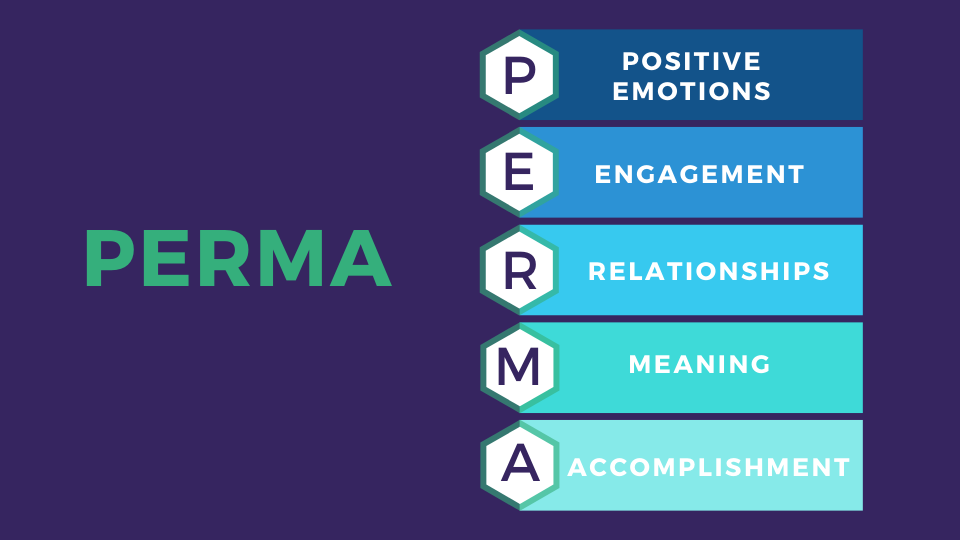This blog explores the PERMA+ model of wellbeing and shares evidence-based ideas to boost wellbeing amongst individuals and teams.
We use the term wellbeing all the time. Yet many of us seldom take the time to stop and think about what wellbeing actually means.
Researchers and philosophers have been exploring the concept of wellbeing for hundreds of years. Despite this deliberation there is no universal measure or definition of wellbeing.
One model of wellbeing – probably the most researched and recognised – which we find useful in exploring wellbeing with individuals, teams and organisations is PERMA [1].
Rather than thinking of wellbeing as one thing, Martin Seligman, the researcher who developed the PERMA model, encourages us to think of wellbeing as a dashboard of a number of different aspects and attributes.
What is PERMA?
PERMA represents 5 different elements or pillars of wellbeing:
Positive Emotions
Engagement
Relationships
Meaning
Accomplishment
Building on the PERMA model, Tailored Thinking often include an extra “+” which represents overall health.
Positive Emotions
Positive emotions fill us with energy and are associated with creativity, feeling good and being full of life.
3 ideas on how to boost positive emotions ourselves.
Express gratitude. Whether that's saying it aloud to yourself, to someone else or writing it down. Even small things like noting “I am grateful for this morning's cup of coffee” can help you to feel happier and boost positive emotions.
Savour the moment. Try to not think too much about the future or dwell on the past. Appreciate the moment you’re in and engage in the here and now.
Three Good Things. Our brains are wired to focus on the negative. A way to counteract what psychologists call our negativity bias, and get us better at spotting the positive things in our day-to-day lives, is to record or note 3 positive things or experiences that have happened to us.
Engagement
Engagement refers to the extent to which we are fully immersed and absorbed in our tasks and activities. These are things that grab and require your full focus, attention and interest. We are at the distracted age, juggling many tasks and activities without fully focusing on one thing. Yet, when we are fully immersed and engaged in a task this actually fuel us in terms of energy and engagement.
Ideas to build engagement:
Engage in activities that you thoroughly enjoy. Do more of the activities where you lose track of time.
Uni-task. Forget multi-tasking. Focus on one task and do it for a relatively short period of time to avoid being distracted.
Appreciate the now. Appreciate being in the moment and engaging in each activity fully and being aware of how you use your time.
Relationships
As social beings, relationships form a huge part of who we are and what makes us feel good. Simplistically, there are two types of relationships in our lives; the positive and the negative. The positive relationships are the ones which make us feel good about ourselves, they build us up. Negative relationships are the opposite. They bring us down and make us perhaps feel a bit worse about ourselves. Positive relationships bolster and boost our wellbeing whilst negative relationships do the opposite. They can literally and metaphorically suck.
3 ideas to help with relationships.
Uncover relationships which matter most. Prioritise the relationships that make you feel positive and fully energised. Spend time with the people you care about. Really invest in them, ask questions and lean into the conversation.
Quality vs quantity. Limit or dial down negative relationships as much as possible. We have all experienced negative relationships. They wear us down and make us feel bad about ourselves. If they can’t be worked on just limit your time with them to avoid feelings of negativity where possible.
Reach out. Reach out to someone you haven’t spoken to in a while. A family member, friend or an old colleague.
Meaning
When we feel a sense of meaning and purpose it can bolster our wellbeing. As humans we like to feel that the things we do matter and have consequence and resonance. Similarly, when we are lacking meaning and purpose in our lives this can have a negative impact on our overall happiness levels and mental health.
3 ideas to connect with your meaning and purpose.
Uncover what feels meaningful and purposeful to you. What matters to you as an individual? What gives you a sense of purpose? This could be helping people or looking after animals.
Identify your strengths. What are you good at or passionate about? See if you can apply these more into your everyday life.
Get involved with something that matters to you. Volunteering or charity work makes us feel good about ourselves. Do something good for someone else and see how it makes you feel.
Accomplishment
It feels good to achieve things; it makes us feel competent and capable. Accomplishment refers to the extent to which we achieve the things we really want in life and work.
We can gain a sense of accomplishment from big or small things. What matters is the feeling of accomplishment we get. For example, it could be getting through a shift at work, tackling the weeds in your garden or simply sending an email.
3 ideas to boost feelings of accomplishment.
Find out what makes you feel accomplished. Experiment with yourself with tasks at work or at home and be mindful of what makes you feel a sense of accomplishment. Everyone will be different so don’t worry if it’s a small task!
Write a to-do list. Checking off a to-do list gives us that feeling of accomplishment like we’re getting closer to achieving our goals.
Set yourself micro goals. Goals don’t always have to be big! Set yourself small, achievable goals that will create a sense of accomplishment like finishing a jigsaw.
+ Health
Health is the foundation of wellbeing. It is directly influenced by our sleep, nutrition, exercise and staying on top of any underlying medical or health conditions. These all impact our levels of wellbeing and quality of life and therefore it's important to make sure you get a good balance.
3 ideas to boost your health.
Get into a routine. Designate specific times for going to sleep and waking up (if this is possible). Set an alarm if needed to remind yourself to go to bed to begin to wind down and another alarm when you need to go to sleep. Also reduce your screen time before bed as this can trick your brain into thinking it's daytime.
Set yourself micro goals to get more active. Exercise releases the feel good hormone serotonin. Small goals to increase your physical activity will make you feel better. For example, this week I will try one new workout on Tuesday morning at 8am before work.
Increase the good stuff. Be mindful and curious about what food and activities makes you feel energised and what makes you feel lethargic. Get as much of the good stuff as you can like nourishing food, quality sleep or your favourite exercise or activity. Schedule the time in and make it easier for yourself (for example preparing food or your clothes the night before).
Time to experiment
Whilst it’s important to reflect and learn about what influences our wellbeing, the real change to our health and happiness comes from our actions and behaviours.
So what are you going to change and experiment with today?
We hope these tips are useful to you. If you would like to learn more on the PERMA model go to our website https://tailoredthinking.co.uk/wellbeing or try out our new digital tools on buoyant wellbeing https://tailoredthinking.co.uk/dbw.
References
SELIGMAN, M. E. P. (2013). Flourish: a visionary new understanding of happiness and well-being [1].




